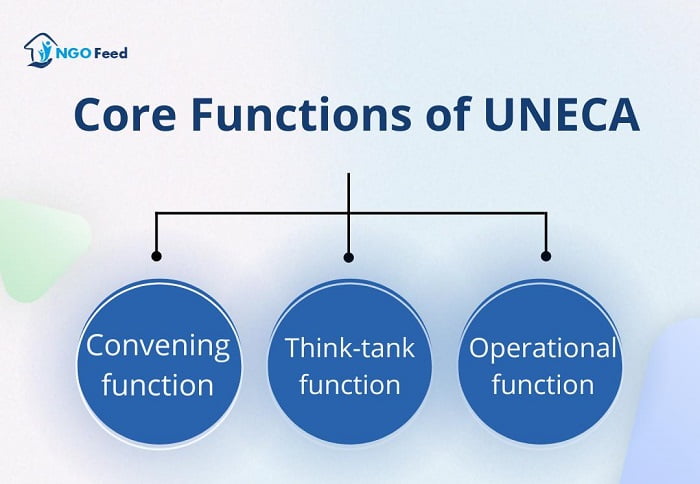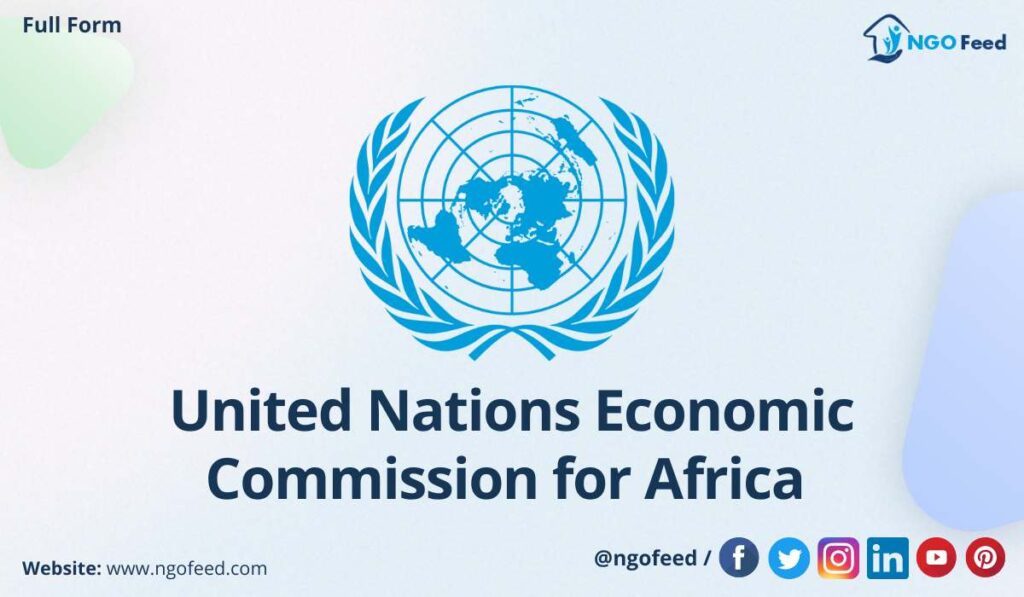UNECA Full Form: ECA was established by the United Nations (UN) Economic and Social Council (ECOSOC) in 1958 as one of the UN’s five regional commissions. Its mandate is to promote its member countries’ economic and social development, foster intra-regional integration, and promote international cooperation for Africa’s development. The United Nations Economic Commission for Africa promotes the economic and social development of its member States, fosters intra-regional integration, and promotes international cooperation for Africa’s development. Here, you will have complete information about it.
With 54 member countries and a dual role as a regional arm of the UN and a key component of the African institutional landscape, the ECA is uniquely positioned to address the continent’s development challenges. Throughout this article, you will provide complete information about UNECA, such as how they work, core functions, objectives, work member state, etc.
Table of Contents
UNECA Overview
Today UNECA is functioning in additional than 54 member countries and works for Africa’s development.
| UNECA | United Nations Economic Commission for Africa (UNECA) |
| Headquarters | Addis Ababa, Ethiopia |
| Type | Primary Organ – Regional Branch |
| Formation | 1958 |
| Executive Secretary | Vera Songwe |
| Parent Organization | United Nations Economic and Social Council |
| Website | www.uneca.org |
| Member | 54 Member |
What is UNECA
The mandate of the ECA is to promote the economic and social development of its member countries, intra-regional integration, and international cooperation for Africa’s development. The ECA’s strength stems from its position as the only UN agency mandated to work at the regional and subregional levels to mobilise resources and direct them toward Africa’s priorities.
ECA focuses on collecting up-to-date and original regional statistics to ground its policy research and advocacy on clear objective evidence; promoting policy consensus; providing meaningful capacity development; and providing advisory services in key thematic fields to increase its impact.
Read also:
Core Functions of UNECA
In this section, we will provide you with detailed information about the UNECA core function and their work agenda, mainly the contribution of UNECA to the task of carrying forward the 2030 Agenda and Agenda 2063 is centred on the Commission’s three core functions, which are articulated below: convening, think tank, and operational.

UNECA Work
In this section, you will get information about the UNECA work; let’s look.
| Data and statistics | Economic development and planning |
| Gender equality and the empowerment of women | Macroeconomics and governance |
| Poverty, inequality and social policy | Private sector development and finance |
| Private sector development and finance | Regional integration and trade |
| Subregional activities for development | Technology, climate change and natural resource management |
Programme of UNECA
From the below table, you will get information about the UNECA program.
| African Centre for Statistics | Macroeconomic Policy |
| Social development Policy | Innovation and Technology |
| Regional integration and Trade | Capacity Development |
Members States
Following are the list of member states of the Commission, along with their date of admission:
| Countries | Countries |
| Albania | Latvia |
| Andorra | Liechtenstein |
| Armenia | Lithuania |
| Austria | Luxembourg |
| Azerbaijan | Malta |
| Belarus | Republic of Moldova |
| Belgium | Monaco |
| Bosnia and Herzegovina | Montenegro |
| Bulgaria | Netherlands |
| Canada | North Macedonia |
| Croatia | Norway |
| Cyprus | Poland |
| Czech Republic | Portugal |
| Denmark | Romania |
| Estonia | Russian Federation |
| Finland | San Marino |
| France | Serbia |
| Georgia | Slovakia |
| Germany | Slovenia |
| Greece | Spain |
| Hungary | Sweden |
| Iceland | Switzerland |
| Ireland | Tajikistan |
| Israel | Turkey |
| Italy | Turkmenistan |
| Kazakhstan | Ukraine |
| Kyrgyzstan | United Kingdom |
| Uzbekistan | United States of America |
Conclusion
The United Nations Economic Commission for Africa (UNECA) is very important for the social and economic growth of the 54 countries that are a part of it. UNECA is a key organization for tackling the continent’s development problems because it works to promote international cooperation and integration within its own area. UNECA works to make a difference in important areas like economic planning, gender equality, and regional integration by focusing on policy study that is based on data, building people’s skills, and advocating for change. As the UN’s regional office, UNECA is still dedicated to advancing Africa’s development plan so that everyone can live a better life in the future.
Read also:
Frequently Asked Questions (FAQs)
Q. What is the Full form of UNECA?
Ans. United Nations Economic Commission for Africa (UNECA).
Q. How many countries are in the United Nations Economic Commission for Africa?
Ans. There are 54 members of the UNECA.
Q. Who is the head of the UNECA?
Ans. Vera Songwe is the Executive Secretary of the United Nations Economic Commission for Africa.

